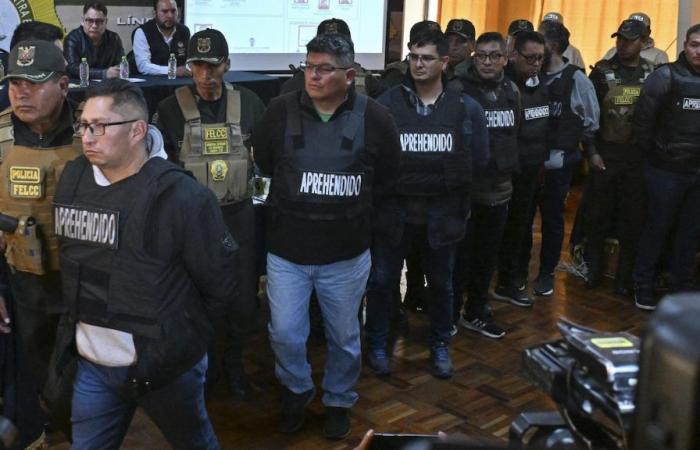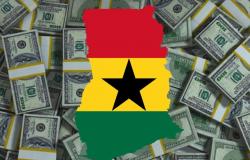Bolivian authorities paraded handcuffed detainees before the media on Thursday, announcing 17 arrests in the wake of a failed coup in a country gripped by a severe economic crisis.
The institutional storm lasted only a few hours, but enough to reveal the country’s fragilities as appetites sharpened in view of the 2025 presidential election.
The motivations of army chief Juan José Zuniga, who had stationed men and armoured vehicles in Murillo Square, opposite parliament and the presidential palace, remain unclear.
Before his arrest by the police, then that of the head of the Navy Juan Arnez Salvador – the two men were prosecuted for armed uprising and terrorism
and face up to 20 years in prison – General Zuniga had said he wanted years”,”text”:”restructure democracy, to make it a real democracy […] Not that of a few, not that of a few masters who have been running the country for 30 or 40 years”}}”>restructure democracy, make it a real democracy […] Not that of a few, not that of a few masters who have been running the country for 30 or 40 years.
He also claimed to have acted on the orders of the head of state, who had asked him to stage something to increase one’s popularity
.
President Arce, demoting General Zuniga and swearing in a new command of the armed forces on Wednesday, affirmed on the contrary that this is a attempted coup by military men who soil the uniform
.
Open in full screen mode
General Juan Jose Zuniga following his arrest on June 26
Photo : Reuters / Claudia Morales
Destroy democracy
His Minister of Government (Interior), Eduardo Del Castillo, castigated two putschist soldiers who wanted to destroy democracy
.
On Thursday, he presented to the media 15 other people arrested, handcuffed, surrounded by police. This operation had been planned since May.
he said, adding that three other suspects were being sought.
According to Mr. Del Castillo, the plan to oust Mr. Arce was directed
by Mr. Zuniga and Mr. Arnez.
The United Nations called on Thursday a thorough and impartial investigation into allegations of violence
.
Although the institutional order has only slightly wavered, strong images remain. That of a door to the presidential palace being forced by an armored vehicle and the entry into the crowd of General Zuniga, the securing of the square and the firing of tear gas by the soldiers leaving eight injured, and the images of the conversation between MM. Arce and Zuniga, distributed by the presidency.
I am your captain […] brings all military police back to the barracks […] withdraw all these forces now. This is an order, general, you’re not going to listen to me?
then reprimands President Arce.
The general looks at him and answers with a non
categorical.
After the military withdrew from Murillo Square, President Arce appeared on the balcony of the presidential palace to greet the crowd that had gathered there. No one can take away the democracy we have won.
he chanted.
Open in full screen mode
Luis Arce, President of Bolivia, waves the country’s flag from the presidential palace on June 26, 2024, in the wake of what he denounces as an attempted coup.
Photo : afp via getty images / AIZAR RALDES
“Symptom of discontent”
Condemnations of General Zuniga’s actions have poured in from all South American countries, but also from Spain, France and the United States.
Russia, which had received Mr. Arce, a rare visit by a foreign head of state to the country since the outbreak of the conflict with Ukraine in February 2022, underlined on Thursday its solidarity with Bolivia, a brother country and a reliable and strategic partner
according to Russian Foreign Minister Sergei Lavrov.
The spokesperson for the Russian presidency, Dmitri Peskov, warned against any interference
foreigner in the internal affairs of Bolivia.
But for Gustavo Flores-Macias, from Cornell University in the United States, The fact that the coup failed does not mean that the situation in Bolivia is resolved, on the contrary. It was a symptom of a very significant discontent that exists in broad sectors.
Open in full screen mode
Bolivia’s President Evo Morales resigned in 2019 before taking refuge in Mexico.
Photo : Getty Images / Hector Vivas
Economic turbulence and political conflict
This episode comes against a backdrop of severe economic turmoil caused by falling incomes due to low production of gas, the country’s main source of foreign currency until 2023, a surge in prices and the scarcity of dollars causing anger traders of all kinds, while a fuel shortage stretches queues in front of service stations.
Above all, in the background is the conflict between Mr. Arce and his political mentor, former President Evo Morales (2006-2019), both of whom are keen to run on behalf of the ruling party, the Movement Toward Socialism (MAS), in the 2025 presidential election.
General Zuniga had expressed his strong opposition to a possible return to power of Mr. Morales, who enjoys strong support throughout the country, but who, according to a decision of the Constitutional Court, cannot compete.






